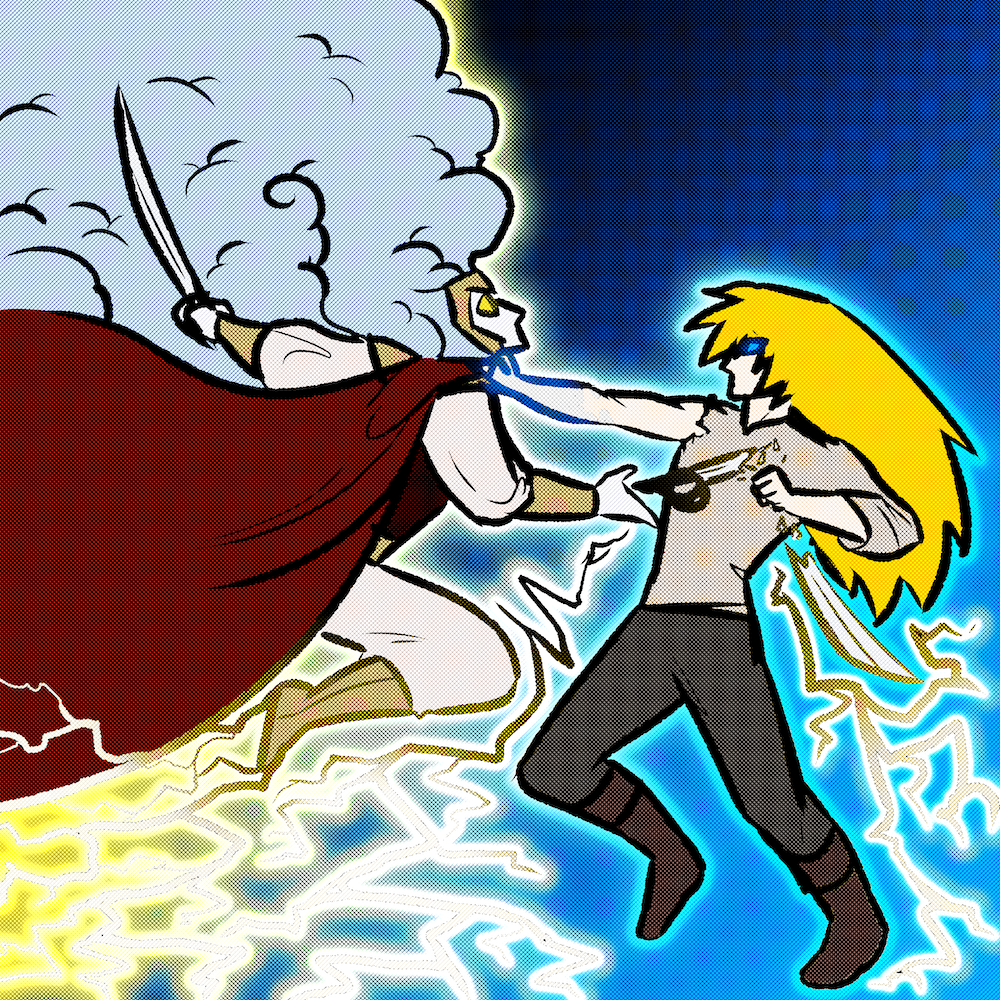Vash’s Sword
A first-time visitor to Vash more intimately familiar with the other large, irregularly-shaped cities of the Helm-west continents may initially be surprised to observe both its comparatively small area and its perfectly circular border wall. Upon entry into the city, they are liable to be further surprised to find that the city of Vash is, functionally speaking, a large, shallow bowl. Radial streets slope gently into the center of the city, intersecting in the central courtyard at the foot of the shining edifice of Vash’s central administration cathedral, crisp white stone overlaid with an enormous brass-and-crystal rendition of Vash’s symbol – a simplified image of the crossguard of his blade.
But the exact center of the city is not within this structure; instead, it lies under a simple pedestal with Vash’s sword embedded halfway into the stone.
Many odd properties of the city and its god become somewhat less opaque when one learns that the city of Vash was constructed in the remnants of an ancient crater, a scar on the surface of the planet caused by a meteoric impact. Since its inception as a tiny settlement, the people of Vash have always found its natural wall – especially once supplemented by an additional man-made defensive structure – rendered the crater-city eminently defensible, especially after their god first manifested. As the city grew in size, rather than attempting to expand beyond the crater borders for anything more than farmland, the citizens of Vash began to build up, constructing taller towers and utilizing space more efficiently than their sprawling sibling cities.
Deep below the city is a vast freshwater reservoir, replenished whenever it rains – the sloping streets temporarily become glittering riverways as the water rushes to the center of the city and filters down through the drains. In extreme downpours, mild flooding can occur in this central courtyard, but such storms typically have minor gods of their own, and ever since the battle with Tynan, the Storm of Terror, most such storms have opted to skirt around Vash rather than risk his ire.
Within that reservoir, some say, lie the remnants of the meteor that carved out Vash all those millennia ago. While we cannot speak to the veracity of these rumors, we know with certainty that at least one ingot of this alien metal survived the impact, as it was forged by Tahraim, smith of the gods, into the very blade Vash wields.
The story goes that Vash was still a fledgling god, hardly a generation old, when Tynan began to approach the southwest coast of his continent. Tynan was rare among nature gods; some could say he was more human than most. Most nature gods are not actively worshipped, and are sustained instead by the passive awareness of mortals. Tynan preferred to be feared, and in pursuit of this goal, his storm swept across the warm ocean waters, accumulating power and malice in equal measure. With each city he deluged, every harvest he drowned, every ship he smashed along the reefs, the terror of his name grew in kind.
Vash, young but already remarkably strong, decided his city would not be counted among those whose fear fed Tynan’s fury. Tynan in turn decided that destroying Vash and drowning its inhabitants would grant him fear in equal measure from all who bore witness. As his storm began to crest over the horizon, Vash readied himself for war.
Vash, it is said, approached Tahraim the Smith in his forge and asked him to craft him a divine weapon, as he had done for many deities before him. Tahraim, it is said, carefully selected a polished blue crystal and an ingot of silvery metal and gave them, untempered, to the puzzled god. Tahraim told Vash (it is said) that he could craft him a weapon from these materials, but only after Vash had made them his own. Otherwise, they would simply be a sword – they would not be HIS sword.
Uncertain of the meaning behind the smith’s cryptic words, Vash left with the crystal and the ingot and, weaponless, prepared for battle.
It is unnecessary to recount the blow-by-blow of their conflict; suffice to say that Vash struggled mightily against the storm god, whose incarnation reformed itself again and again, being made of ephemeral lightning, wind and water. Without his incarnation, Vash was only a city; Tynan was still a vast and powerful storm. Only one of them could afford to lose their body.
With the loss of a left eye and a right hand slowing him down, Vash (it is said) unraveled Tahraim’s riddle and, with the slightest exertion of divine power, made the crystal and the ingot “his own”. The crystal replaced his damaged eye, and the metal flowed easily into place of his right hand.
Not yet a sword but far more than a weapon, Vash’s power increased mightily with these materials infused into his incarnation, and some records claim he blazed like a blue sun as he drove Tynan back, burning away his thunderclouds and shattering his twin swords with an effortless twist of his shining right hand. Tynan defeated, Vash bound him to an oath and exiled him to forever wander the oceans, never approaching the shore.
True to his word, Tahraim forged Vash his sword, and its power has aided him ever since.
